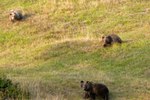News
Bruin is back!
Apr 26, 2012
/
alpMedia
The number of bears in the province of Trento has grown, while the damage they cause has fallen significantly, states the report on bears in the province. But not all is well for Bruin and friends.

Image caption:
Brown bear in Trentino: damage caused by bears in 2011 fell by around half compared to 2010. © Günther Dotzler/pixelio.de
It is clear from the latest report that bears feel very much at home in the province of Trento. The bear population in the Trentino and its surroundings continues to increase and is now estimated at 33 to 36 animals, with at least four cubs. The report contains more than just data and facts about these large predators: it also records the compensation payments for damage caused by the animals and the protective measures taken. In comparison with the previous year, the recorded damage to agriculture decreased by around half, with a total of somewhat more than 43,000 euros paid out. On the one hand, the bears' natural habitat offered them enough to eat while, on the other, over 700 protective measures were taken, e.g. erection of fences.
With over 30 years' experience in handling Bruin and his ilk, the province of Trento has shown that damage can largely be prevented, but that good communication is also needed alongside compensation payments.
Bears have however become extinct in the Limestone Alps, announced the WWF in Austria recently. Between 1989 and 1993 three bears were released there. The small initial population is one reason for the failure of the project: the other is poaching, with more than 20 bears missing.
Source and further information:
www.orso.provincia.tn.it/rapporto_orso, www.kora.ch/news/archiv/20120301d.htm (de), www.bafu.admin.ch/dokumentation/fokus/12020 (de), www.corriere.it/cronache/12_aprile_22 (it)
With over 30 years' experience in handling Bruin and his ilk, the province of Trento has shown that damage can largely be prevented, but that good communication is also needed alongside compensation payments.
Bears have however become extinct in the Limestone Alps, announced the WWF in Austria recently. Between 1989 and 1993 three bears were released there. The small initial population is one reason for the failure of the project: the other is poaching, with more than 20 bears missing.
Source and further information:
www.orso.provincia.tn.it/rapporto_orso, www.kora.ch/news/archiv/20120301d.htm (de), www.bafu.admin.ch/dokumentation/fokus/12020 (de), www.corriere.it/cronache/12_aprile_22 (it)


